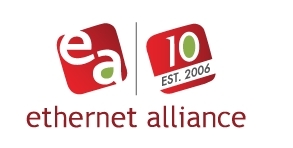BEAVERTON, Ore.--(BUSINESS WIRE)--Capitalizing on the groundbreaking market impact of the most deployed Ethernet specification to-date, the 1000BASE-T standard, the Ethernet Alliance and the NBASE-T Alliance today announced a new collaborative effort designed to accelerate mainstream deployment of 2.5GBASE-T and 5GBASE-T Ethernet. This technology multiplies network throughput of the more than 70 billion meters of Cat5e and Cat6 cabling sold throughout the last 13 years. As part of the push to leverage this massive infrastructure, the two organizations plan to validate multi-vendor interoperability at a plugfest event scheduled for the week of October 10, 2016 at the University of New Hampshire InterOperability Laboratory (UNH-IOL) in Durham, NH.
“The availability of tested, interoperable equipment conforming to a single standard will drive future generations of advanced network performance and innovative new applications,” said John D’Ambrosia, chairman, Ethernet Alliance; and senior principal engineer, Huawei. “As IEEE prepares to ratify the IEEE P802.3bz™ 2.5GBASE-T and 5GBASE-T standard, our upcoming plugfest will help speed its global adoption and make the most of the expansive 1000BASE-T infrastructure that exists today. As the leading industry voice of Ethernet, our mission is to accelerate its deployment. This joint initiative with the NBASE-T Alliance is a natural progression of that goal.”
“Based on the strong ecosystem developed by the NBASE-T Alliance, and the rapid adoption of 2.5GBASE-T and 5GBASE-T technology, we are ready for the next phase of broad deployment,” said Peter Jones, chairman, NBASE-T Alliance; and principal engineer, Cisco. “The unparalleled benefits of 2.5GBASE-T and 5GBASE-T Ethernet technology are enabling new capabilities throughout the industry and the upcoming plugfest will be a significant milestone to showcase this success. We look forward to the joint plugfest with the Ethernet Alliance to speed product deployment and move the industry forward.”
From Specification to Full Deployment
IEEE P802.3bz™ defines 2.5GBASE-T and 5GBASE-T and offers a seamless upgrade to 1000BASE-T operation, which was introduced nearly 20 years ago. The new specification enables up to five times the speed with no changes in cabling infrastructure required, resulting in a better user experience. In addition, 2.5GbE and 5GbE are well suited to interconnect to the next generation of higher-speed wireless networks based on IEEE 802.11ac™.
With its expected ratification by IEEE in September 2016, the Ethernet Alliance and NBASE-T Alliance are co-sponsoring a cooperative plugfest during the week of October 10, 2016. Both organizations will share post-event results of the interoperability testing performed, demonstrating the rapid maturation of 2.5GBASE-T and 5GBASE-T Ethernet technologies and their deployment readiness. The Ethernet Alliance and NBASE-T Alliance will continue to develop market awareness and education as 2.5GBASE-T and 5GBASE-T technologies are deployed on a global basis.
For more information on the Ethernet Alliance/NBASE-T Alliance plugfest, please contact morgan@ethernetalliance.org or admin@nbaset.org.
About the Ethernet Alliance
The Ethernet Alliance is a global consortium that includes system and component vendors, industry experts, and university and government professionals who are committed to the continued success and expansion of Ethernet technology. The Ethernet Alliance takes Ethernet standards to market by supporting activities that span from incubation of new Ethernet technologies to interoperability demonstrations and education.
About the NBASE-T Alliance
The NBASE-T Alliance is an industry-wide cooperative effort focused on enabling the development and deployment of products that support 2.5G and 5GBASE-T Ethernet. The alliance publishes specifications, sponsors and implements interoperability and certification programs, and facilitates consensus for the purpose of finalizing the IEEE 802.3bz standard. The alliance has developed and released the NBASE-T specification that is compatible with the technical baselines defined in the current draft of the IEEE 802.3bz standard. The specification enables member companies to immediately develop and deploy 2.5G and 5GBASE-T products, making use of the large, installed base of copper cabling, such as Cat5e and Cat6, found in enterprise networks, home networks and service providers.




